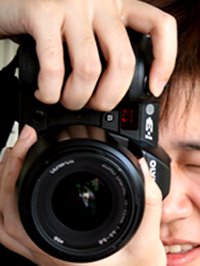Do you think...you can make a camera by yourself ???
The answer is YES !!! We call this simple type of camera is
"A PIN HOLE CAMERA"
- The first thing to do is paint the lid black, inside and out. This helps light-proof the box. Be sure to use flat black paint, rather than glossy paint that will reflect more light.
- Cut a small hole (about the size of a matchbox) in the center of the canister bottom (the nonremovable side).
- Cut out a piece of heavy-duty aluminum foil, or heavy black paper, about twice the size of the hole in the bottom of the canister.
- Take a No. 10 sewing needle and carefully make a hole in the center of the foil. You should only insert the needle halfway, or the hole will be too big. For best results, position the foil between two index cards and rotate the needle as you push it through.
- Tape the foil over the hole in the bottom of the canister, so the pinhole is centered. Attach the foil securely, with black tape, so light only shines through the pinhole.
- All you need for the shutter is a piece of heavy black paper large enough to cover most of the cannister bottom. Tape one side of the paper securely to the side of the cannister bottom, so it makes a flap over the pinhole in the middle. Tape the other side of the flap closed on the other side of the pinhole. Keep the flap closed until you are ready to take a picture.
- To load the camera, attach any sort of film or photographic paper to the inside of the canister lid. Of course, for the film to work, you must load it and develop it in complete darkness. With this camera design, you won't be able to simply drop the film off at the drug store -- you'll have to develop it yourself or get someone to help you.
Choosing a good camera design, film type and exposure time is largely a matter of trial and error. But, as any pinhole enthusiast will tell you, this experimentation is the most interesting thing about making your own camera.
More information about Pin hole camera:
- A pinhole camera is simply a box with a tiny hole in one side and some film or photographic paper on the opposite size. If the box is otherwise "light-tight," the light coming through the pinhole will form a real image on the film. The scientific principle behind this is very simple.
- If you were to shine a flashlight in a dark room, through a tiny hole in a wide piece of cardboard, the light would form a dot on the opposite wall. If you moved the flashlight, the light dot would also move -- light beams from the flashlight move through the hole in a straight line.
- In a larger visual scene, every particular visible point acts like this flashlight. Light reflects off each point of an object and travels out in all directions. A small pinhole lets in a narrow beam from each point in a scene. The beams travel in a straight line, so light beams from the bottom of the scene hit the top of the piece of film, and vice-versa. In this way, an upside down image of the scene forms on the opposite side of the box. Since the hole is so small, you need a fairly long exposure time to let enough light in.
- There are a number of ways to build this sort of camera -- some enthusiasts have even used old refrigerators and cars as light-tight boxes. One of the most popular designs uses an ordinary cylinder oatmeal box, coffee can, or similar container. Its easiest to use a cardboard container with a removable plastic lid.
Reference: Tom Harris. "How Cameras Work". March 21, 2001 http://electronics.howstuffworks.comcamera6.htm (July 08, 2007)



